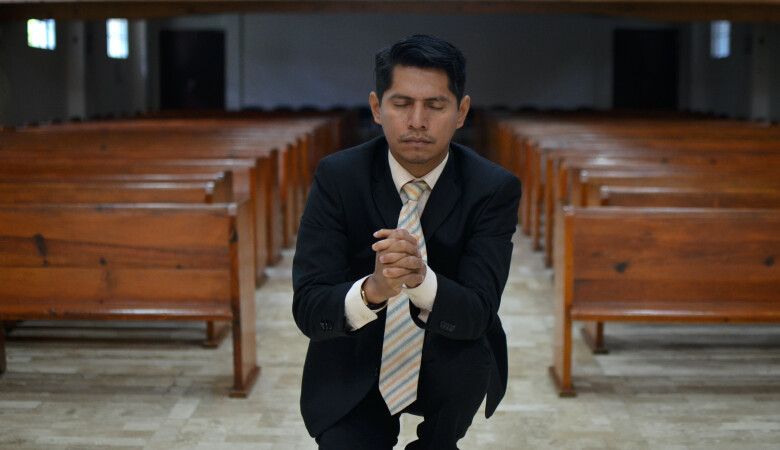From Adam to Noah
October 03, 1999 | Andy Davis
Genesis 5:1-32
Redemption, Old Covenant, The Word of God, Prophecy
Genealogies. . . What’s in a name(s)?
Morning. Why don't you take your Bibles and turn to Genesis chapter 5. Let's take a look at what the scripture says in there. Now you say, "Wait a minute. This is a genealogy. What are we going to get out of this?" But we're going to find all kinds of things in here that will be useful to us, I trust. But the scripture says, "All scripture is God-breathed and is useful for teaching, rebuking, correcting and training in righteousness, so that we may be thoroughly equipped for every good work." And so, that includes Genesis 5 and God has something to say to us today through this. There's actually a great deal in here that is relevant to some of the struggles and the issues that the church is facing today. You personally may not face some of these things, but I think as we continue to look through this you'll see just how relevant this is.
Now recently, scientists in Russia uncovered a frozen woolly mammoth, a little baby woolly mammoth. And they took it out and they took a portion of the tissue and sent it to University of Rochester for carbon 14 dating. And you know what, they came to the conclusion that that woolly mammoth had died 27,000 years ago. Well, you may just accept that and that's not really much of a problem for you. But if you were to go down, for example, to the Museum of Life and Science down here and start looking at some of the samples and the fossils and different things, you're going to see 1.3 million years on this one, 700,000 years on that one, and after a while, you begin to wonder how in the world does that line up with what we read here in Genesis? Especially if we're going to take a literal view of Genesis 1 as seven days. And then there's this careful listing of time here. How do we reconcile that?
And furthermore, just in general, why does God take time to give this information, the genealogy. It's not just here, but in chapter 11 also. And then in Chronicles, there's long genealogies which have people that none of you or I have ever heard of, and yet here they are. They make it into scripture and it's a puzzlement to us as we look at it. Why would God take so much time to go through this? But I think we're going to see that as we contrast this with chapter 4, which we just went through, we see the development of God's redemptive plan even beginning here in this chapter. This genealogy makes it over into Luke chapter 3, into Jesus's genealogy as well. The end of all this is salvation for you and me. So why don't we take a minute and read through these verses and see what God has to say to us from them?
I'm going to begin at chapter 4:25. It says there that “Adam lay with his wife again and she gave birth to a son and named him Seth, saying, ‘God has granted me another child in place of Abel, since Cain killed him.’ Seth also had a son and he named him Enosh. At that time, men began to call on the name of the Lord.”
Chapter 5. “This is the written account of Adam's line. When God created man, He made Him in the likeness of God. He created them male and female and blessed them. And when they were created, he called them man. When Adam had lived 130 years, he had a son in his own image, in his own likeness, and he named him Seth. After Seth was born, Adam lived 800 years and had other sons and daughters. Altogether, Adam lived 930 years and then he died. When Seth had lived 105 years, he became the father of Enosh. And after he became the father of Enosh, Seth lived 807 years and had other sons and daughters. Altogether Seth lived 912 years and then he died. When Enosh had lived 90 years, he became the father of Kenan. And after he became the father of Kenan, Enosh lived 815 years and had other sons and daughters. Altogether Enosh lived 905 years and then he died. When Kenan had lived 70 years, he became the father of Mahalalel. And after he became the father of Mahalalel, Kenan lived 840 years and had other sons and daughters. Altogether, Kenan lived 910 years and then he died."
"When Mahalalel had lived 65 years, he became the father of Jared. And after he became the father of Jared, Mahalalel lived 830 years and had other sons and daughters. Altogether, Mahalalel lived 895 years and then he died. When Jared had lived 162 years, he became the father of Enoch. And after he became the father of Enoch, Jared lived 800 years and had other sons and daughters. Altogether, Jared lived 962 years, and then he died. When Enoch had lived 65 years, he became the father of Methuselah. And after he became the father of Methuselah, Enoch walked with God 300 years and had other sons and daughters. Altogether, Enoch lived 365 years. Enoch walked with God and then he was no more because God took him away. When Methuselah had lived 187 years, he became the father of Lamech. And after he became the father of Lamech, Methuselah lived 782 years and had other sons and daughters. Altogether, Methuselah lived 969 years, and then he died. When Lamech had lived 182 years, he had a son. He named him Noah, and said, 'He will comfort us in the labor and painful toil of our hands caused by the ground the Lord has cursed.' After Noah was born, Lamech lived 595 years and had other sons and daughters. Altogether, Lamech lived 777 years, and then he died. After Noah was 500 years old, he became the father of Shem, Ham and Japheth."
The Long March Back
This is, I believe, at the beginning of what we could call the long march back from the fall in the Garden of Eden, all the way back, ultimately, to redemption and to salvation. We see here, I think, the multiplication and also the division of the human race. Now, last week in Genesis 4, we saw Cain and his descendants, and I think they represent the seed of the serpent, those who will not obey God, those who will not follow God, those who scorn him or reject His ways. Like Lamech here at the end of chapter 4, who boasts that he killed a man for wounding him, and then says, "If Cain is avenged seven times, then Lamech seventy-seven times." That boastful tyrant attitude that we see in Lamech, a whole development I believe in chapter 4 of the seed of the serpent.
But then we also have the development of the seed of the woman, those who are godly, those who want to follow and to obey the Word of God, and Seth is the first step back in that regard. And so we see both the multiplication of the human race through this genealogy and also the division of the human race into two tracks: those who will obey, who will believe, who will follow, and those who simply will not.
Seth — The Beginning of the Godly Line
So Seth was the first step back. He was able Abel's replacement, as it says in verse 25, "Eve named him Seth and said, 'God has granted me another child in the place of Abel since Cain killed him.'" She was grieved over the death of Abel, and so God replaced him and she named him Seth. Now she, still searching as they all were, all the believers, for the serpent slayer, the one who would come and crush the head of the serpent. Little did she know how much human history would have to go before that serpent slayer would come. But she's still hopeful and she's looking for someone who's going to replace Abel. Now, Seth was included, as I said, in Christ's genealogy, so she wasn't far wrong. She was just wrong in terms of the amount of time it would take. Seth was a godly step in the right direction. Now, as I said, Eve gave him the name, but you can see down in chapter 5:3, it says that Adam named him Seth, so both Adam and Eve got together on the name of the child.
Now sometimes husbands and wives struggle over this. You know, you need to get a book or something to figure out the names. And maybe one or the other will capitulate or give in and what the name will be, but in this case Adam and Eve got together and they named him Seth. Now, it's significant because I said to you in chapter 2, that Adam's naming of the animals was significant, it shows a sense of authority and also his naming of his wife Eve, that she would someday be the mother of all living. But now here, the parents get together and they name their child. Now, there are exceptions in Scripture, for example, Jesus. Mary, and Joseph were not permitted to name Jesus. He was named by God the Father Himself. "You will give him the name Jesus, because He will save his people from their sins." But here, Adam and Eve together named Seth, and it shows their authority, the authority of parents over children. It says in Proverbs 6:20, "My son, keep your father's commands and do not forsake your mother's teaching." So children are to submit to both their mother and their father, a sense of authority and training in the children, and we see that in the naming of Seth.
Calling on the name of the Lord
Now, it says also at the end of chapter 5, that, "At that time they began to call on the name of the Lord." Now, you know this is a very significant phrase in scripture, and very important. What does it mean to call on the name of the Lord? This is, I believe, the beginning of perhaps organized religion, organized, perhaps even sacrificial system, in calling on the name of the Lord. But we know from Romans chapter 10, that it is required for salvation. It says in Romans 10:13, "Everyone who calls on the name of the Lord, will be saved." So what does it mean to call on the name of the Lord? It means to call on God as He has revealed Himself to us. To call on Him as He has revealed himself as a holy God, a righteous God who hates sin, but also a God who is working out His redemptive plan in history. Now, that plan had just gotten started at that point, but they were in faith coming together and they were calling in the name of the Lord. It also perhaps refers to deepening prayer, a deepening prayer life. To call on the name of the Lord means to pray. To seek Him in prayer.
Now, all of us, we do not understand what kind of fellowship Adam and Eve had with God in the garden before the fall, just how close and how intimate they were with God, and that that has been lost through sin. And so this is an indication, I think of a separation between God and the human race at this point. You need to call on the name of the Lord. It says in Psalm 10:1, "Why, O Lord, do you stand far off? Why, O Lord, do you stand far off and why do you hide yourself in time of trouble?" Do any of you ever feel that way? That God is far off from you and that you need to call on him. And sometimes it seems as though he's not answering. Well, David in Psalm 10, gives that indication. It's the same here in chapter 4, as they're calling on the name of the Lord. They're yearning for Him to reveal Himself to them.
Well, this sets the stage for the genealogies of chapter 5. They're beginning to call on the name of the Lord, Seth has been born, and at this point, in chapter 5, the author of Genesis steps aside and gives us this genealogy. I've told you before about verse 1, it says, "This is the written account of Adam's line." In the Hebrew language, this little phrase separates all the sections of the book of Genesis. It's a written account, or what came out from Adam's line. Now the question we have to ask is, why does God take time with these genealogies? What's the reason for it? Have you ever read the genealogy, the First Chronicles, for example? Have you ever memorized the genealogies of First Chronicles? Probably none of you have. Alright, the Jews actually did. They spend a lot of time memorizing genealogy, they're very important to them.
Why the genealogies?
I think the first lesson from the genealogies is that our faith, the Christian faith, is a historical faith. It matters to us what happened before. It matters to us that there were some that lived so many generations ago and did such and such a thing. It matters. It's significant. You know, I've mentioned before that liberal theologians say it really doesn't matter whatsoever if Jesus ever lived or not. It really doesn't matter whether He died on the cross. It doesn't matter whether He rose from the dead. It just matters how we respond to it, whether it does something inside us, gives meaning to our lives.
Well, a true Christian will say that's totally false, because as the Apostle Paul said, "If Jesus Christ has not been raised from the dead, we are still in our sins." Historical events matter in the Christian faith and genealogies are one way that God tells us that. Also, it shows us the significance of a single human life. Your life means something. Now, it may be that your descendants, if the Lord doesn't return, five, six generations from now, won't even know your name. They won't know anything about you, but God knows, and everything you do is significant. Every decision you make is significant, good or bad. Everything is noted. It's all significant.
And these genealogies, people you've never heard of, are very important to God because they're created in His image, and so He keeps a record of them. And it matters to Him that so and so lived so many years and had other sons and daughters. It matters to Him. And so it should give significance to you. If these people aren't significant to you, then why would your life be significant to somebody who came after? But it is significant and your life does matter because you are created in the image of God.
Well, the third point of these genealogies, as I've mentioned, is God's creation and redemptive plan. His creation plan was that Adam and Eve should have children and should fill the Earth. They should multiply, and they should fill the earth and subdue it. That was His original plan. And remember that I connected that with another verse which says that, "The earth will be filled with the knowledge of the glory of the Lord as the waters cover the sea." He wanted the whole globe filled with His image, and that was going to happen through biological processes where these, Adam and Eve, were to have children and they also were to have children. And so that was His original creation plan. But then sin came in and affected that plan greatly. It disturbed the plan. It started to tear it apart.
And so God promised in Genesis 3 to work out a redemption plan, and He does it through the same means, through husbands and wives coming together and having children. Through ultimately, through those processes, Jesus Christ born of the flesh, born of a woman, but born also as the Son of God. And so His redemption plan worked out even through this genealogy.
The Pattern of Genealogies
Now, as you look at chapter 5, you can see very clearly a certain pattern of these genealogies. One person after the other handled about the same way. There are five elements or five common features to these genealogies, with some significant deviations, and we'll talk about those in a moment.
- But the first thing it says is that so and so lived so many years and became the father of such and such. In every case, it says that.
- And then secondly, it says, so and so lived so many years after becoming the father of such and such. It's not easy to do the so and sos and the such and such, I had to work on this, so it wouldn't get too confusing here.
- But then the third point is that they had other sons and daughters.
- And number four, that all the days or all the days of someone's years were so many years. In other words, they were so old when they died.
- And then the fifth feature is that every single one of them, save one, died.
Those are the five common features. And there tends to be a sense of repetition here because I think the author is trying to focus on something, I'll talk to you about that in a moment, but there's a sense of repetition as this thing just moves on through. We also see the expansion of population here. It's really difficult to have any idea how many people were alive at the time of the flood. Really I have no idea. But it says here that each of the people on this line, and this was just one of the lines because Adam had other sons, he had Cain for example, and Cain had some, and there were others, but we're following the godly line of Seth here. So this is just one genealogy, one line. And so we can sense that there may be an even an immense multiplication or expansion of population here. These people lived to 900, almost a thousand years, and they were bearing children well into that time. Adam bore his sons when he was 500 years old, and nothing's even mentioned about it. It's not even seen as significant. Now, later on, when Abraham and Sarah have a child in their old age at age 100, that scene is significant, age 90 for Sarah. But at this point, it's nothing for these people to have children at age 500. And so this points, I think, to a tremendous expansion of population.
If each one of the people in this genealogy had the one son mentioned and then other sons, say three sons altogether and daughters, that's five at least, then we can imagine that probably there are far more than that with all the years that they could be alive. We're talking about an incredible expansion of population. And there was plenty of time for it too. There were 1656 years, if you count it up, from Adam to the flood, so the population may have been even in the billions. We have really have no idea when the flood came. It also points, as I said to this one godly line, in Seth in the midst of all the ungodliness. Can you imagine? And we'll get to this as we talk about the flood next week, where every thought and inclination of the heart was only evil all the time.
And yet in the midst of this, God has this godly line growing up, protecting His chosen people. His godly remnant in the midst of an ungodly world. And we see that even now, even today. Even in our generation we see the same thing. God knows how to protect a spark, to protect His chosen ones through all of this ungodliness. And one after another gives birth, but the ratios, we really don't have any idea. How many people really loved the Lord? How many people really called in the name of the Lord? We don't really know. We already learned from the Sermon on the Mount that there's not many. Jesus said, "Enter through the narrow gate. For wide is the gate and broad is the road that leads to destruction, and many enter through it. But small is the gate and narrow the road that leads to life and only a few find it." So it was in the days of Noah as well.
Development of human culture before the flood
This godly line in the midst of a development of ungodliness. And also we can guess that there may have been a tremendous development of culture and of technology at this point. Last week, we looked at Tubal-Cain, the one who knew about metallurgy and the tool making and all that. Do you realize how inefficient death is for technology transfer? You probably never thought about that before, but you know, you get proficient in your field, in your career, and then you have to retire. And all that knowledge and all that experience you've accumulated, it's gone now. Why? Because of aging, because of death and you don't have time to transfer all that information to the next generation. They have to learn it themselves. But if you live into age 900, you can have quite a career, and there's incredible technology that grows. I mean, how would you like to work to age 900? Mandatory retirement at age 910 or 915, something like that. But this is the development here. And so again, I think we tend to think of these folks as backward, almost like cave-dwelling type people. I don't think there's any reason to see it that way. There was plenty of time for them to become proficient in what it was they did.
Scientific problems: Age of the patriarchs; Age of the earth
Now, all of this brings us to some scientific problems with this, and as Christians, we need to face this face on. We can't hide our head in the sand, we can't let the world run along, and the rest of us say, "Well, I think that the Earth is 6,000 years old." And really have no way to defend it. It makes us seem like fools, but we're not foolish. There's good reason to believe what the scripture simply says. There are two questions that faze us when we come to Genesis 5, and they both have to do with age, because this is a time chapter. The first is the age of the patriarchs. How in the world could these folks have lived almost a thousand years? We don't see anything like that today. And so doesn't that tend to make you question the scripture, say, "This doesn't seem possible. How can we have the patriarchs living to this old age?" And second of all, it brings us to the question on the age of the Earth. How old is the Earth and how old is the human race on the Earth?
Well, let's take the first one. The age of the patriarchs. In order to answer this question, we have to understand what aging is, don't we? What is aging? And there's a lot of research that's going on in this, but as you look at it, it's kind of hard to figure it out, to understand why it is we age. We're eating the same foods, we're doing the same thing, and yet our capability just drops off with every decade. Why is that?
Some people who do research on a genetic level say it has to do with radiation that comes and effects cell division and multiplication. Your body... I forget the... other than the nerve cells, the brain cells, it changes every X number of years, I don't know what that is, every six or seven years, you get a whole new body because the cells die and new cells are replaced. But if there's radiation from the sun coming in and affecting that, some problems start coming in, and that's called aging. And over the years, function decreases and that's because of the problems with this. And also we have the problem disease coming in and affecting. Disease spreading all over the earth and it affects you. You get sick, you get well again, but maybe you're never quite the same. It affects you. All of this affects aging. Now, I believe as you look back in those days before the flood, I think that the earth was significantly different in terms of its climate than it is now. I believe that there was a canopy of water from which all that water came, which now fills much of the oceans. All the water that flooded the earth to a depth of 20 meters over the highest mountain, that's a significant amount of water. Where did it come from? Well we'll talk about that next week.
But the water came from underneath, but also it rained down from above, and I believe that there was a canopy of protection around the Earth which protected people from radiation at that point. And there also wasn't the development of disease, so it's quite possible that people could have lived after the flood, don't you see the ages dropping rapidly? Within a couple or three generations, four generations, you've got Abraham and he's dying at a much younger age than his ancestors did. And within a few generations after that, they're pretty much where we are in terms of the length of age. That's just one possibility in looking at the age of these patriarchs.
The second is the issue of the age of the Earth. Now, back in the 17th century, an Irish Archbishop named James Ussher, came up with a chronology of the whole earth, and he said that he earth was formed in the year 4004 BC. I'm not hearing any laughing — you're supposed to be laughing right now, it's supposed to be a joke. I just said that the Earth was formed in the year 4004 BC. Well, if we filled this room with a bunch of scientists and others who do not love the Lord or the scriptures, there would have been laughter, that would have been a joke. But I'm glad it's not a punch line here at First Baptist. However, at the same time, can it be supported? How do we jive the 4004 BC date with what we're getting from science? Can they really be put together? Well, first of all James Ussher did is just add up what we've got here in chapter 5 and also chapter 11, and bring in some archeological data about when the exodus was and put the whole thing together.
And I think if you were to do this same thing, you wouldn't get too much a different outcome that the earth was created. So it really comes down to a contest of whether the scripture is speaking accurately or whether science is speaking accurately about the age of the earth. Well, why then does science say that the Earth is four and a half billion years old, and that the universe is 15 billion years? Well, first of all, 6000 years is insufficient time for evolution, there's just not enough time. There is no way that we could have evolved from apes in 6000 years, no way, and they know that they need time. There's got to be plenty of time, it's the only wild card that they have. It's the only way the Carl Sagan can say over billions and billions of years, that these molecules kind of assemble themselves in ever increasing complexity. If they don't have time, then they don't have evolution. You've got to have time.
Reliability of dating techniques
Well, is there any scientific backup for it? There's only the way that they do what we call absolute dating in the earth, and with this, you look at radiometric dating and some other techniques. For example, when I began my sermon today, I talked about this baby woolly mammoth, they named it Bema, little Bema. We don't know how old Bema is, but they're saying 27,000 years. Well, what happened to that tissue sample? Well they took the tissue sample and they send it to University of Rochester, and the scientists there put it in a specially designed container, and they were able to read the radiation coming out of that from carbon 14. Now, all of you have radioactivity inside your bodies right now, I bet you didn't know that. You came here this morning with it, it's inside you. You know why? Because you're eating plants and you're eating things that eat plants, and through photosynthesis, carbon 14, which is created when radiation comes in and hits the atmosphere, it's created. You take it in your bodies and it starts to accumulate in your body over a period of time. Now, if you take a tissue sample from one of you, any of you want to give a tissue sample? They would be glad to take it and you'll add to scientific knowledge on carbon 14 dating.
You can sign up for that. I don't have the information, but if you're interested, just ask and you can give a tissue sample, they know how much carbon 14 there is in your body. And what they figured out is, they say, if we can take a sample from Bema or from some other thing, and read the amount of carbon 14 in it. And then we realized that over a period of time, about 5600 years, it doubles or going back the other way, it gets cut in half, the number of carbon 14, it decays. It's gone.
And so over a period of time, they can work back and they say, well, Bema was a baby mammoth of such and such a size at age such and such amount, so it should have had so much carbon 14 in it, we find that there's far less carbon 14 and the difference is how they add up the years. Well, they've made some incredible, significant assumptions here. First of all, they've assumed that things have always been the same, and none of us was here were they? A billion years ago? None of us. Now, these guys, they could compete a little when they live up to a thousand years, but we die at about 75, 80, 85 years old. That's all the information we have. We sure weren't around when Bema died, whenever that was, and we weren't around about 1.5 billion years ago either. So we have to make some scientific assumptions through the dating. And the assumption is that things have always been the same, and that all of us accumulate carbon 14 at about the same level. Now, they can't prove that. Nobody can. It's an assumption. Now, science is based on assumptions that are proved or not proved. The fact is they can't prove it.
Now, let me say to you this, what if? What if there were a flood, and what if before the flood there was a big canopy around the earth. And what if under that canopy there was 3 or 5 or 10 or 500 times as much vegetation on the Earth as there is now, what then? Maybe all that carbon 14 would get spread out very thinly and Bema wouldn't take in as much carbon 14. We don't really have any way of knowing. So when you go to the Museum of Life and Science and it says 1.5 billion years or something like that, don't you believe it. You take your scripture and you read it simply and say, I have every good reason to believe this as much as a scientist does to make a leap of faith on his dating techniques. And the same goes for potassium-argon dating and all the uranium-lead dating. It's all the same thing. They assume that they know how much was there and how much is in the rock now. And it's all the same kind of technique. So you don't need to be ashamed. Just take the Bible and read it simply the way it's given to you, it's the word of God.
Spiritual lessons from genealogy
Now, I've had to do all that because I don't think we can keep our head in the sand any longer. I'd just like to go right to the spiritual lessons from Genesis 5, and there are some, but I think it's important for us to be able to hold our own and hold our heads up and say we don't need to be embarrassed any longer to say I believe that the earth was 6000 years old, and that the scripture is just the way God presented it. Now, on those spiritual lessons, I'm going to focus on three individuals from this. I'm going to look at Adam, I'm going to look at Enoch, and I'm going to look at Noah.
Adam
First, the lesson from Adam is simple, and that is that God keeps His promises. In this case we could say God keeps His warnings. He promised Adam that if he ate from the tree of the knowledge of good and evil, that he would die. And Adam dies in this chapter because God said he would. Genesis 2:17, "You must not eat from the tree of the knowledge of good and evil, for when you eat of it, you will surely die.”
And then after he ate of it, he said, now it's done. Chapter 3:19, he says, “By the sweat of your brow, you will eat your food until you return to the earth, since from it you were taken, for dust you are, and to dust you will return.” And here in this chapter, Adam returns to dust. He returns to dust. Now, Adam was the head of the whole human race. In verses 1 and 2 of this chapter, chapter 5,
it says, “When God created man, He made them in the likeness of God, he created a male and female and blessed them. And when they were created, he called them man.” Now, the word Adam is just the Hebrew for man, and basically saying that Adam was... This man was the head of the human race, and when he sinned, we all sinned in him. And so original sin, the doctrine of original sin comes in through that way, and any of you who have raised young children, you know that it's true, don't you? And any of you who have looked at your own life, you know it's true, don't you? Original sin, every single one of us has sin as soon as we understand right from wrong, as soon as we understand it, we sin. Sin entered the world through one man and death through sin, and in this way death came to all men because all sinned.
And it says in verse 3 of chapter 5, “When Adam had lived 130 years, he had a son in his own likeness, in his own image, and he named him Seth.” Why does it say that? Because Seth acquired that sin nature, it started right there, and then when Seth had a son, it was in his own image and on it gets passed. We are all under the sin because of Adam. And so David says in Psalm 51:5, “Surely I was sinful from birth, sinful from the time my mother conceived me.” That's the testimony of scripture. And the wages of sin is death, as Paul tells us, and we see that here in this chapter. Now, Jesus Christ came very plainly to overturn the death.
And we see it in verse 8, verses 11-14, it says, “All together, Seth lived 912 years and then he died, altogether Enoch lived 905 years, and then he died. Altogether, Kenan lived 910 years and then he died. Altogether, Mahalalel lived 895 years, and then he died. Altogether, Jared lived 962 years, and then he died. Methuselah 969 years, and then he died. Lamech lived 777 years, and then he died.” Do you see that drone of death? And it surrounds us. Even now we have loved ones that we think of, that we miss and we feel weak in the face of death. What can we do about death? It's a terrible problem. And it's a spiritual issue that comes right out of chapter 5, and what are we going to do? Well, only the serpent slayer can answer that, Jesus Christ. It says in Hebrews 2:14, “Since the children have flesh and blood, he too shared in their humanity so that by his death, he might destroy him who holds the power of death, that is the devil.” And free those who all their lives were held in slavery by their fear of death. Hebrews 2:14 and following. That's a great section of Scripture. Jesus' death conquers death, and by His death we're not slaves to fear of death any longer, because there is life after death through Christ.
Enoch
1 John 3:8 says the reason the son of God appeared was to destroy the devil's work. And what was the devil's work? To bring death into the world, and so Jesus has done that, the serpent slayer. We praise God for that. And in the middle of this depressing drone, as we read verse after verse, we get a clear indication of God's intention don't we? With Enoch, Enoch, a shining star in the midst of all this darkness, we have Enoch, seventh from Noah, according to Jude, seventh from Noah. And so Jude upholds the accuracy of this genealogy, there's not big gaps in here. Jude says very plainly that Enoch lives seventh from Adam. And what does it say about Enoch? Verse 21, it says, “When Enoch had lived 65 years, he became the father of Methuselah. After he became the father of Methuselah, Enoch walked with God and had other sons and daughters. Altogether, Enoch lived 365 years, Enoch walked with God and then he was no more because God took him away.” This is evidence of God's grace. Death was conquered with Enoch, God just took him right to heaven without him having to pass through death. Praise the Lord.
To some degree he's the first fruit, the clear indication of God's intention to overturn the curse of death because Enoch walked with God. Now, what does it mean to walk with God? It means daily communion, daily step-by-step obedience to God, a faithful walk with Him, through prayer through listening to God's commands and obey Him. And that was Enoch. This expression is used throughout scripture, it's used of Noah in Genesis 6:9, it says that Noah was a righteous man, blameless among the people of his time, and he walked with God, and he walked with God. And then God appears to Abraham in Genesis 17:1 and says, “I am God almighty, walk before me and be blameless.” Walk before me. It means live every day, seven days a week, not just on Sundays. When you come to worship, alright, God sees it. He accepts your worship. But what do you do on Monday?
What about Tuesday? What about 9 in the morning? What about 10 at night? Walk with God step-by-step. That's the way Enoch lived his life. Faithful obedience. God said the same thing to Israel in Deuteronomy 30:15-16, “See, I set before you today, life and prosperity, death and destruction for I command you to love your God, to walk in his ways, and to keep his commands.” Walking step-by step in fellowship with Jesus Christ. We as Christians, we have the indwelling Holy Spirit, don't we? What a gift. And it says according to Galatians 5, since we live by the Spirit, let us keep in step with the Spirit. Walk with the spirit. When he prompts you to do something, do it and you'll be like Enoch. I'm not promising that you'll miss out on death, it may be, if we're the final generation, you may well miss out on death. I tell you a mystery, we shall not all sleep, but we will all be changed. It's possible, but if the Lord tarries, you will have to suffer death. Hebrews 9:27 says, so he's appointed to each one of us to die once and then to face judgment. But for those who walk with God on earth, there is no condemnation. There is no condemnation, we don't have to stand under the guilt of our sin, but we're free forever.
And so God sent His Son, Jesus Christ, and He sent the Holy Spirit. And why? So that we could walk as Enoch did. In Colossians 1:10, “We pray this in order that you walk worthy of the Lord and may please Him in every way.” Colossians 2:6, so then just as you receive Christ Jesus as Lord continue to what? Walk in him, continue to walk in him. 1 John 1:7, “If we walk in the light, as He is in the light, we have fellowship with one another, and the blood of Jesus cleanses us from all sin.” Now, what was Enoch's reward? I don't know what that must have been like. I don't know if he went up through the heavens. Elijah didn't die either, he went up in a chariot of fire, I don't know what Enoch's form of conveyance was, all I know is that according to Hebrews 11:5, they looked for him and couldn't find him. It says, “By faith, Enoch was taken from this life, so that he did not experience death. He could not be found for God had taken him away.” That means some people were looking for him.
Now, I don't know if Tim LaHaye is right about that sudden rapture, that you're going to be pulled up out of your clothes or any of that kind of... How many of you read Left Behind? That secret rapture? You're going to leave your clothes behind and go up and... I don't know if that's... That detail I do not find in scripture. It's interesting to hypothesize about this kind of thing, but I know this, that Enoch was translated bodily up into heaven, and they couldn't find him. They were looking for him and couldn't find him. And I think that he did this as a gift to him, a gift to Enoch, to spare him from evil. Any of you who have ever lost a loved one, or if you're ever afraid of losing a loved one, you ought to write down Isaiah 57:1-2. Isaiah 57 are comforting verses, and you should read it and get the truth into your mind before you come to that point of grief. If you have a godly loved one and you wonder. . .Why did God take them? Isaiah 57 says plainly; “Devout men are taken away and no one understands that the righteous are taken away to be spared from evil.” God says you've had enough evil, you've suffered enough, and he just takes Enoch out. So he doesn't have to suffer any longer. Of those who died in Isaiah 57:2, it says, “Those who walk uprightly,” there's that walking again. Those who walk uprightly enter into peace, they find rest as they lie in death. Isn't that comforting to know that a loved one who's walked with the Lord, they're free from other suffering. They're in peace because they walked with the Lord. Comfort yourself with that verse when the time comes.
Noah
And speaking of comfort, the third key individual here is Noah, and his name means comfort. When he was born, his father Lamech said He will comfort us from all the labor and the painful toil of our hands caused by the ground the Lord has cursed. You know I did some calculations and apparently, Lamech was 56 years old when Adam died. Think about that. Lamech, Noah's father was 56 years old when Adam died. There's every good indication that Adam and Lamech knew each other and spent time talking together, and I bet you he got all this from Adam. He said, all this came because of our sin. Don't sin. Walk with God, obey Him. And so he names Noah and thinks about the curse that came through his ancestor, Adam. And he said through Noah will come this comfort because of the ground that God has cursed.
Now, we're going to talk much about Noah over the next few weeks, so I'm not going to say much more about him today. Just that he was a godly man who walked with God and whose greatest form of comfort was his obedience to the commands and the warnings of God. And in that obedience, all of us, all of us find our survival. We were saved because of Noah's obedience, and in that way, we have comfort and salvation.
Applications:
Now, as we look at this chapter and we look at the things we've learned in it, there's some applications we can take from it.
- The first is simply this, as I mentioned earlier, your life is significant. God watches everything you do. Absolutely everything is written down in his books. He notes it all, it's all important. And it doesn't much matter whether later generations know your name. The overwhelming majority of people who have ever lived slip into obscurity within three, four, five generations. Nobody knows them, but God knows. And your life is significant because you're a child of God.
- Now it's significant, either for good or for ill, and the key thing is simply this, are you walking with God? Are you step-by-step walking in obedience to His commands? He has not been silent, He's told us what we are to do. Do you read these words as though they were your life? When you take them in, do you read them to obey? Are you walking in holiness? Are you walking in fellowship? Prayers of consecration. Moment by moment dependence. Are you walking with purpose? Ephesians 2:10, one of my favorite verses in all scripture says, “We are God's workmanship created in Christ Jesus to do good works, which God prepared in advance that we should walk in them.” He's lined out a corridor of good works for you to do, walk in them, walk in them, just like Enoch did.
- And the final question I'd ask you is simply this, are you ready for death? Are you prepared? Today could be the last day of your life. I don't really have any way of knowing one way or the other. I've been to funerals and I've been involved in the lives of people at all different age categories. You don't really have any idea what is your final day. Be ready, be ready. And there is no way that you can be ready for death apart from faith in Jesus Christ. Some people say, “I don't fear death.” And as I listen to them, I say you should fear death. You should be very afraid of death because your soul is not saved. And if your soul is not saved, if your soul is not saved, you are under the wrath of God for every sin you've ever committed. Remember I told you your life is significant, every decision you've ever made has been noted. Come out from under the wrath of God through faith in the blood of Jesus Christ.
We're going to open up the altar in a few moments here. If you need salvation, come forward and give your life to Jesus Christ. Give yourself to Him. Jesus is the only salvation God has provided. The only freedom from death. He is your comfort in the face of death. If you would like to just simply come and kneel and pray, the altar is open for you to do that. Come and pray. If you'd like to come forward and become a member of the church, come and talk to us we'll let you know about that. Anything that you want to do about that please come forward.






























